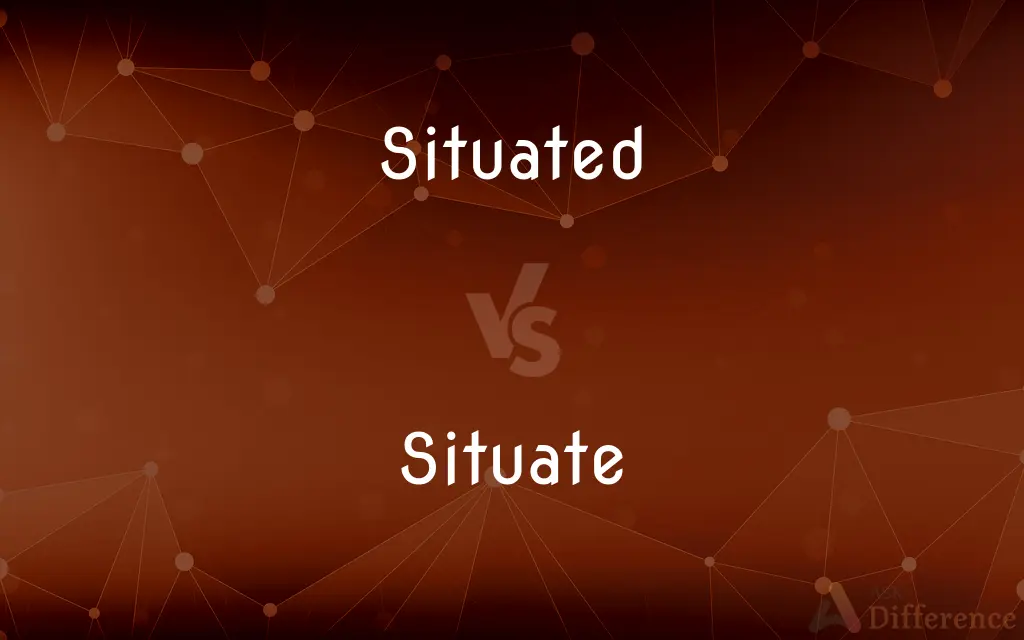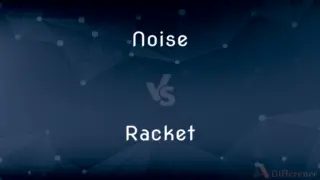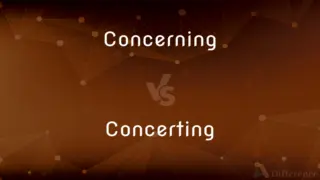Situated vs. Situate — What's the Difference?
By Maham Liaqat & Urooj Arif — Updated on March 26, 2024
"Situated" is often used as an adjective meaning located or positioned, typically in a specific place (e.g., The house is situated by the lake). "Situate" is a verb meaning to place or set in a particular position.

Difference Between Situated and Situate
Table of Contents
ADVERTISEMENT
Key Differences
"Situated" describes the state or condition of something's location, emphasizing its placement within a particular context or environment. It's commonly used to convey where something is in relation to its surroundings. Whereas "situate" refers to the action of placing or positioning something in a specific location. This verb implies intentionality in the placement or arrangement of the object in question.
In usage, "situated" is often part of a passive construction or serves as an adjective, contributing to descriptions of scenes, locations, or contexts. It helps in painting a vivid picture of the setting or position. On the other hand, "situate" is active, indicating the process or action of positioning. This distinction highlights the role of the subject in affecting the placement of an object or themselves.
The grammatical roles of "situated" and "situate" also differ significantly. "Situated" can be used as a past participle or an adjective, which means it modifies nouns and typically follows a form of the verb "to be." Whereas "situate" functions as a verb that requires a subject to perform the action, often followed by an object that is being placed.
Both terms contribute to the language of location and placement but from different angles. "Situated" focuses on the result or outcome of the positioning process, offering a static description. In contrast, "situate" emphasizes the dynamic process of placement, indicating movement or intention to locate something precisely.
Despite their differences, both "situated" and "situate" share a common root in the concept of positioning. They complement each other, with "situate" focusing on the action leading to a state or condition that "situated" describes. This connection underscores the relationship between action and state within the context of location and placement.
ADVERTISEMENT
Comparison Chart
Definition
Being located in a specific place or position.
To place or set in a specific location or position.
Part of Speech
Adjective or past participle.
Verb.
Usage Example
The cafe is situated at the corner of the street.
We will situate the statue in the center of the garden.
Focus
Describes the current state or condition of placement.
Describes the action of placing or positioning.
Implied Action
None (static condition).
Active process of positioning or placing.
Compare with Definitions
Situated
Describing the placement relative to surroundings.
The ancient ruins are situated below the mountain peak.
Situate
To place or position something specifically.
They plan to situate the new park next to the library.
Situated
Implies a fixed or established location.
The university is situated in the heart of the city.
Situate
Involves intentional arrangement or positioning.
The architect will situate the windows to capture the morning light.
Situated
Located or positioned in a specific place.
The hotel is situated on a quiet street.
Situate
Can imply preparing or adapting something for a context.
The curriculum is situated to meet local educational needs.
Situated
Can reflect a metaphorical position.
The theory is situated within a broader academic discourse.
Situate
May involve locating oneself or something in relation to others.
The campers situated their tents around the fire.
Situated
Often used to detail geographic or spatial contexts.
The village is situated near the riverbank.
Situate
Reflects the process leading to a situated state.
The artist situates her work within the tradition of landscape painting.
Situated
In artificial intelligence and cognitive science, the term situated refers to an agent which is embedded in an environment. The term situated is commonly used to refer to robots, but some researchers argue that software agents can also be situated if: they exist in a dynamic (rapidly changing) environment, which they can manipulate or change through their actions, and which they can sense or perceive.Examples might include web-based agents, which can alter data or trigger processes (such as purchases) over the internet, or virtual-reality bots which inhabit and change virtual worlds, such as Second Life.
Situate
To place in a certain spot or position; locate
The statue is situated in the center of the fountain.
Situated
Having a place or location; located
A cabin nicely situated on a quiet riverbank.
Situate
To place in a given context, category, or set of circumstances
"It was hard for him to situate her in any of the usual categories reserved for women" (Jane Urquhart).
Situated
Supplied with money
A family that has always been well situated.
Situate
Situated.
Situated
Located in a specific place.
Situate
(transitive) To place on or into a physical location.
The statue is situated in a corner hardly visible to the public, except through a window from an outside maintenance area situated behind the building.
Situated
Supplied with money or means.
Situate
(transitive) To place or put into an intangible place or position, such as social, ethical, fictional, etc. Most commonly used adjectivally in past participle and often used figuratively.
The mayor is situated between probable censure and possible recall.
Situated
(sociology) Embedded or rooted within a culture.
Situate
Situated.
Situated
Simple past tense and past participle of situate
Situate
(heraldry) Situated; located.
Situated
Situated in a particular spot or position;
Valuable centrally located urban land
Strategically placed artillery
A house set on a hilltop
Nicely situated on a quiet riverbank
Situate
Having a site, situation, or location; being in a relative position; permanently fixed; placed; located; as, a town situated, or situate, on a hill or on the seashore.
Situate
Placed; residing.
Pleasure situate in hill and dale.
Situate
To place.
Situate
Determine or indicate the place, site, or limits of, as if by an instrument or by a survey;
Our sense of sight enables us to locate objects in space
Locate the boundaries of the property
Situate
Put (something somewhere) firmly;
She posited her hand on his shoulder
Deposit the suitcase on the bench
Fix your eyes on this spot
Common Curiosities
How do you use "situate" in a sentence?
"Situate" is used to describe the action of placing or setting something in a particular position, e.g., "The plan is to situate the new sculpture in the main plaza."
What does it mean when something is "situated"?
It means that something is located or positioned in a specific place, often described in relation to its surroundings.
What is the difference between "situated" and "located"?
"Situated" and "located" are often used interchangeably, but "situated" can imply a more specific or contextual placement than "located."
Can "situated" describe abstract concepts?
Yes, "situated" can also describe the positioning of abstract concepts within particular contexts or frameworks.
How does the use of "situated" affect the description of a place?
Using "situated" can add specificity and context to a description, enhancing the listener's or reader's understanding of a location's characteristics.
Is "situate" only used for physical objects?
While commonly used for physical objects, "situate" can also refer to abstract placement, such as situating an argument within a debate.
Why is it important to distinguish between "situated" and "situate"?
Distinguishing between them helps clarify whether you're describing a static condition (situated) or the action of placing (situate).
Do "situated" and "situate" have the same root word?
Yes, they both derive from the Latin "situs," meaning position or site.
Can "situated" and "situate" be used in the same context?
Yes, they can be related when discussing the placement of something, with "situate" referring to the action and "situated" to the resulting state.
Is "situate" a commonly used verb in everyday English?
While not as common as more straightforward terms like "place" or "put," "situate" is used, especially in formal or written contexts to convey precise positioning.
Share Your Discovery

Previous Comparison
Noise vs. Racket
Next Comparison
Concerning vs. ConcertingAuthor Spotlight
Written by
Maham LiaqatCo-written by
Urooj ArifUrooj is a skilled content writer at Ask Difference, known for her exceptional ability to simplify complex topics into engaging and informative content. With a passion for research and a flair for clear, concise writing, she consistently delivers articles that resonate with our diverse audience.














































